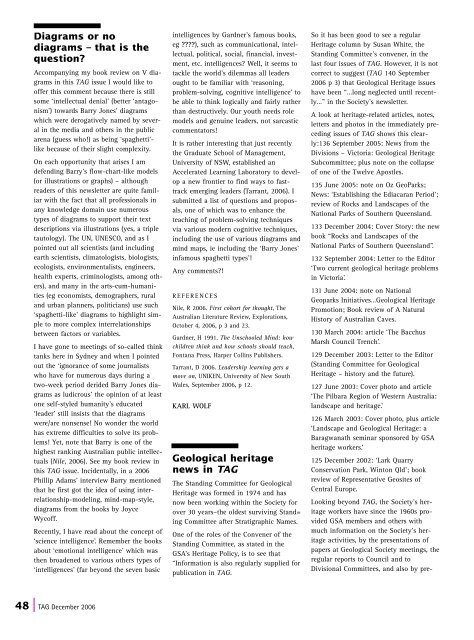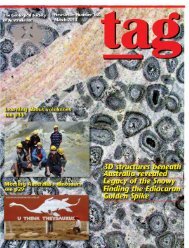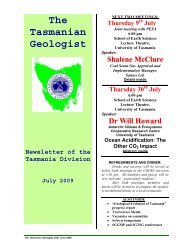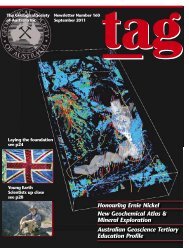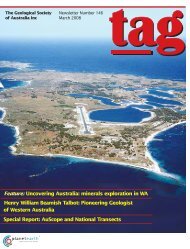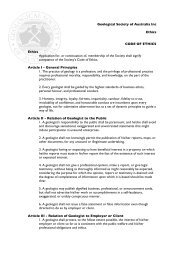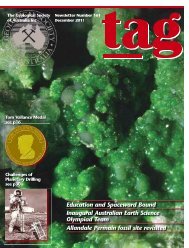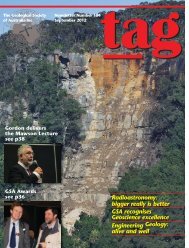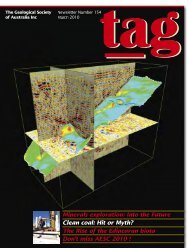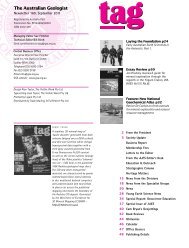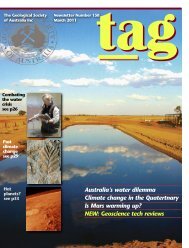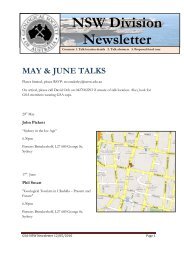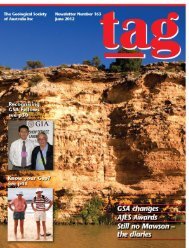The Australian Geologist - Geological Society of Australia
The Australian Geologist - Geological Society of Australia
The Australian Geologist - Geological Society of Australia
Create successful ePaper yourself
Turn your PDF publications into a flip-book with our unique Google optimized e-Paper software.
Diagrams or no<br />
diagrams – that is the<br />
question<br />
Accompanying my book review on V diagrams<br />
in this TAG issue I would like to<br />
<strong>of</strong>fer this comment because there is still<br />
some ‘intellectual denial’ (better ‘antagonism’)<br />
towards Barry Jones’ diagrams<br />
which were derogatively named by several<br />
in the media and others in the public<br />
arena (guess who!) as being ‘spaghetti’-<br />
like because <strong>of</strong> their slight complexity.<br />
On each opportunity that arises I am<br />
defending Barry’s flow-chart-like models<br />
(or illustrations or graphs) – although<br />
readers <strong>of</strong> this newsletter are quite familiar<br />
with the fact that all pr<strong>of</strong>essionals in<br />
any knowledge domain use numerous<br />
types <strong>of</strong> diagrams to support their text<br />
descriptions via illustrations (yes, a triple<br />
tautology). <strong>The</strong> UN, UNESCO, and as I<br />
pointed out all scientists (and including<br />
earth scientists, climatologists, biologists,<br />
ecologists, environmentalists, engineers,<br />
health experts, criminologists, among others),<br />
and many in the arts-cum-humanities<br />
(eg economists, demographers, rural<br />
and urban planners, politicians) use such<br />
‘spaghetti-like’ diagrams to highlight simple<br />
to more complex interrelationships<br />
between factors or variables.<br />
I have gone to meetings <strong>of</strong> so-called think<br />
tanks here in Sydney and when I pointed<br />
out the ‘ignorance <strong>of</strong> some journalists<br />
who have for numerous days during a<br />
two-week period derided Barry Jones diagrams<br />
as ludicrous’ the opinion <strong>of</strong> at least<br />
one self-styled humanity’s educated<br />
‘leader’ still insists that the diagrams<br />
were/are nonsense! No wonder the world<br />
has extreme difficulties to solve its problems!<br />
Yet, note that Barry is one <strong>of</strong> the<br />
highest ranking <strong><strong>Australia</strong>n</strong> public intellectuals<br />
(Nile, 2006). See my book review in<br />
this TAG issue. Incidentally, in a 2006<br />
Phillip Adams’ interview Barry mentioned<br />
that he first got the idea <strong>of</strong> using interrelationship-modeling,<br />
mind-map-style,<br />
diagrams from the books by Joyce<br />
Wyc<strong>of</strong>f.<br />
Recently, I have read about the concept <strong>of</strong><br />
‘science intelligence’. Remember the books<br />
about ‘emotional intelligence’ which was<br />
then broadened to various others types <strong>of</strong><br />
‘intelligences’ (far beyond the seven basic<br />
intelligences by Gardner’s famous books,<br />
eg ), such as communicational, intellectual,<br />
political, social, financial, investment,<br />
etc. intelligences Well, it seems to<br />
tackle the world’s dilemmas all leaders<br />
ought to be familiar with ‘reasoning,<br />
problem-solving, cognitive intelligence’ to<br />
be able to think logically and fairly rather<br />
than destructively. Our youth needs role<br />
models and genuine leaders, not sarcastic<br />
commentators!<br />
It is rather interesting that just recently<br />
the Graduate School <strong>of</strong> Management,<br />
University <strong>of</strong> NSW, established an<br />
Accelerated Learning Laboratory to develop<br />
a new frontier to find ways to fasttrack<br />
emerging leaders (Tarrant, 2006). I<br />
submitted a list <strong>of</strong> questions and proposals,<br />
one <strong>of</strong> which was to enhance the<br />
teaching <strong>of</strong> problem-solving techniques<br />
via various modern cognitive techniques,<br />
including the use <strong>of</strong> various diagrams and<br />
mind maps, ie including the ‘Barry Jones’<br />
infamous spaghetti types’!<br />
Any comments!<br />
REFERENCES<br />
Nile, R 2006. First cohort for thought, <strong>The</strong><br />
<strong><strong>Australia</strong>n</strong> Literature Review, Explorations,<br />
October 4, 2006, p 3 and 23.<br />
Gardner, H 1991. <strong>The</strong> Unschooled Mind: how<br />
children think and how schools should teach,<br />
Fontana Press, Harper Collins Publishers.<br />
Tarrant, D 2006. Leadership learning gets a<br />
move on, UNIKEN, University <strong>of</strong> New South<br />
Wales, September 2006, p 12.<br />
KARL WOLF<br />
<strong>Geological</strong> heritage<br />
news in TAG<br />
<strong>The</strong> Standing Committee for <strong>Geological</strong><br />
Heritage was formed in 1974 and has<br />
now been working within the <strong>Society</strong> for<br />
over 30 years–the oldest surviving Stand=<br />
ing Committee after Stratigraphic Names.<br />
One <strong>of</strong> the roles <strong>of</strong> the Convener <strong>of</strong> the<br />
Standing Committee, as stated in the<br />
GSA’s Heritage Policy, is to see that<br />
“Information is also regularly supplied for<br />
publication in TAG.<br />
So it has been good to see a regular<br />
Heritage column by Susan White, the<br />
Standing Committee’s convener, in the<br />
last four issues <strong>of</strong> TAG. However, it is not<br />
correct to suggest (TAG 140 September<br />
2006 p 3) that <strong>Geological</strong> Heritage issues<br />
have been “…long neglected until recently…”<br />
in the <strong>Society</strong>’s newsletter.<br />
A look at heritage-related articles, notes,<br />
letters and photos in the immediately preceding<br />
issues <strong>of</strong> TAG shows this clearly:136<br />
September 2005: News from the<br />
Divisions – Victoria: <strong>Geological</strong> Heritage<br />
Subcommittee; plus note on the collapse<br />
<strong>of</strong> one <strong>of</strong> the Twelve Apostles.<br />
135 June 2005: note on Oz GeoParks;<br />
News: ‘Establishing the Ediacaran Period’;<br />
review <strong>of</strong> Rocks and Landscapes <strong>of</strong> the<br />
National Parks <strong>of</strong> Southern Queensland.<br />
133 December 2004: Cover Story: the new<br />
book “Rocks and Landscapes <strong>of</strong> the<br />
National Parks <strong>of</strong> Southern Queensland”.<br />
132 September 2004: Letter to the Editor<br />
‘Two current geological heritage problems<br />
in Victoria’.<br />
131 June 2004: note on National<br />
Geoparks Initiatives…<strong>Geological</strong> Heritage<br />
Promotion; Book review <strong>of</strong> A Natural<br />
History <strong>of</strong> <strong><strong>Australia</strong>n</strong> Caves.<br />
130 March 2004: article ‘<strong>The</strong> Bacchus<br />
Marsh Council Trench’.<br />
129 December 2003: Letter to the Editor<br />
(Standing Committee for <strong>Geological</strong><br />
Heritage – history and the future).<br />
127 June 2003: Cover photo and article<br />
‘<strong>The</strong> Pilbara Region <strong>of</strong> Western <strong>Australia</strong>:<br />
landscape and heritage.’<br />
126 March 2003: Cover photo, plus article<br />
‘Landscape and <strong>Geological</strong> Heritage: a<br />
Baragwanath seminar sponsored by GSA<br />
heritage workers.’<br />
125 December 2002: ‘Lark Quarry<br />
Conservation Park, Winton Qld’; book<br />
review <strong>of</strong> Representative Geosites <strong>of</strong><br />
Central Europe.<br />
Looking beyond TAG, the <strong>Society</strong>’s heritage<br />
workers have since the 1960s provided<br />
GSA members and others with<br />
much information on the <strong>Society</strong>’s heritage<br />
activities, by the presentations <strong>of</strong><br />
papers at <strong>Geological</strong> <strong>Society</strong> meetings, the<br />
regular reports to Council and to<br />
Divisional Committees, and also by pre-<br />
48 | TAG December 2006


